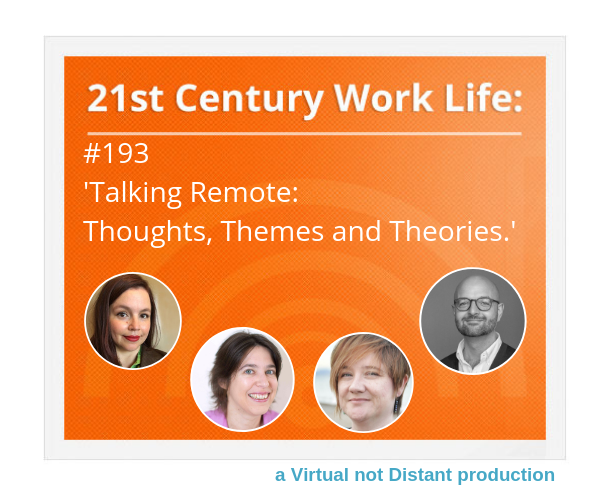WLP193 Talking Remote: Thoughts, Themes and Theories
A slightly different show today, with some new sections – we look forward to your feedback. We love reading your comments and tweets, whether about Pilar’s recent blog post on Visible Teamwork , or what you think of book Thinking Remote: Inspiration for leaders and managers of distributed teams (now available in paperback).
In today’s main section, Pilar and Maya discuss some recent articles about remote and office-optional working which have caught their attention, and raised a range of important issues:
05:44 Articles of Interest
Engaging workers as consumers – Deloitte Insights 28-1-19
Just as work and life are blended in 2019, workers and clients are no longer a dichotomy, and in a digital world we all relate to brands and organisations in complex ways. But they’re all rounded individuals, whether remote colleagues or clients or both. Technology enables more connection and socialisation, but can also create silos and barriers, especially as private conversations may be less visible online than in the colocated space. There are lots of ways to keep in touch within distributed organisations – including an in-house podcast for example.
Flexible working can reinforce gender stereotypes The Conversation Heejung Chung, University of Kent 10-1-19
Reminding us that flexible working still takes place within a wider cultural and business context in which there remains considerable structural inequality, from the gender pay gap to unpaid domestic workload. A very thought provoking article and discussion, from ‘flexibility stigma’ to the difference in remote working culture between the UK and US. Unpicking perceptions from actual phenomena is always complicated, but this stuff is far from straight forward, and it matters.
(Post-publish correction: Pilar mentions around 22mins that the data is from the UK, but that’s incorrect. The author of the piece mentioned on Twitter: The Conversation piece is based on my previous research from @WAFProject and the special issue I've edited: https://link.springer.com/article/10.1007%2Fs11205-018-2025-x (open access!) which brings scholars/papers using data from Across Europe + US (not only the UK) - but we have similar evidence across all countries.)
The Slackification of work Michael Litt, Fast Company, 09-24-18
Well, we didn’t know that Slack originally stood for ‘Searchable Log of All Conversations and Knowledge’ – but it has certainly had a big impact on many workplaces. The article raises questions about impacts on productivity and relationship, and there’s some interesting perspectives.
This has meant some managers having to get comfortable with conversations they don’t directly control. This always happened, people made their own relationships and connections at work, and the remote space is no different. But there is a distinct qualitative difference between a face to face remark and one that is put in writing in any context… “ephemeral does not mean inconsequential“, sums it up perfectly.
41.32 What do you mean by that?
We are joined today to define some important terms, by Dr Richard MacKinnon founder and MD of Work Life Psych .
Productivity: There are many definitions of this term, which may fit different industries and circumstances, but Richard describes it holistically as: doing the right thing, in the right way, at the right time. Framing in terms of impact rather than output, is one way to stop measuring the wrong things, and being busy instead of effective.
Richard McKinnon
Procrastination: Not always correctly used, but this term defines when we delay doing something, and that delay has a negative impact. Why do we do this, tell ourself stories, and put things off until they become problematic? Just get on and make a start – check out ep7 of My Pocket Psych if you need more persuasion!
Habit Stacking: Here’s one way to boost productivity (and maybe even beat procrastination), add the thing you want to do to the thing you already do, as a reminder and trigger. “When I finish eating dinner, I am going to clean the kitchen”. We won’t forget to eat! So connecting the two will enable the building of the new habit we really want to acquire.
Productivity Porn: Reading about productivity, installing new apps, and thinking about how to be productive… That is the opposite of getting things done. Habits require consistency and commitment, and actually doing the work – not forever binging the latest theories and tools instead. (Richard even wrote a post about this!)
Keep up with Richard via his website, particularly the section on productivity, and of course his podcast My Pocket Psych (where our own Pilar Orti is a regular co-host)
51.49 What are you looking for? With Teresa Douglas
Teresa Douglas
Teresa Douglas is the co-author (with Mike Webber and Holly Gordon) of Secrets of the Remote Workforce, and long term friend of The 21st Century Work Life Podcast.
Teresa is researching work friendships in remote teams, because the ways we connect are different online, as we have so often discussed. Are work friends different from non-work friends, are online friends different from face-to-face ones? It’s great to see someone exploring this, and planning to create specific tools to make things easier for remote workers in future.
She would love to hear from more freelancers, as well as remote employees, to ensure breadth within the whole office-optional experience. (Research call-out specific to Spring 2019, but always good to connect anyway!)
Or connect with Teresa on Twitter .
If you like the podcast, you'll love our newsletter:





